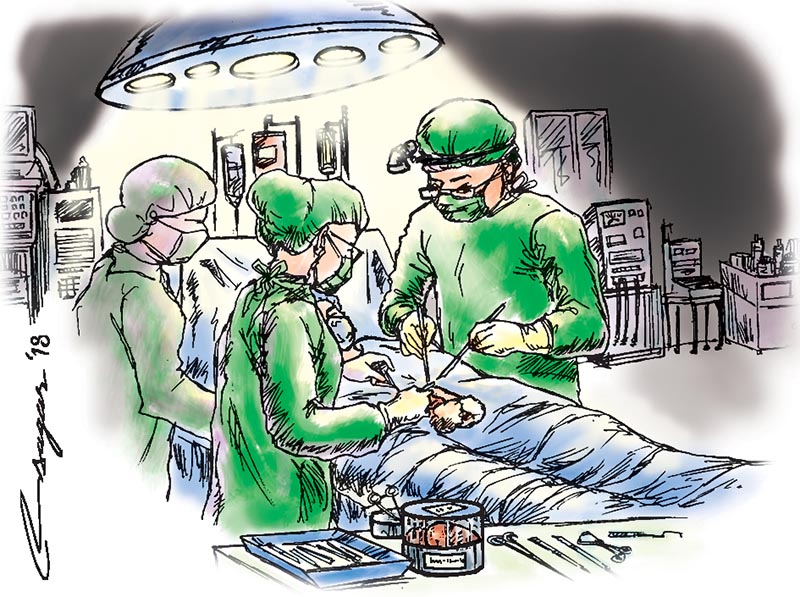Understanding brain death: Proper communication is key
In countries like ours, people often misunderstand and misinterpret brain death, largely due to ignorance. Due to this organ donation becomes difficult. There is a need of proper communication between medical teams and family members
For human body to be in the living state, all the organs must function efficiently. But there are mainly three organs, failure of which will lead to immediate death of human body, and a person will be declared dead. These organs are lungs (respiratory system), heart (circulatory system) and brain (central nervous system).
If one or more of these three organs fail, then it becomes impossible for the human body to survive. Failure of any human organ will ultimately lead to failure of one or all of abovementioned three organs before the death of a human body. Finally, a person is declared dead when the heart stops permanently.
However, there are some situations when the heart keeps on beating even after a person is “dead”. In other words, human body “dies” before the heart ceases to function. This is the situation doctors call “the state of brain death”. In the state of brain death, there is no self-breathing, and breathing is supported by a machine (ventilator). But heart beating is natural, as heart beat cannot be supported or controlled by any artificial means.
Once ventilator is discontinued, heart beating becomes weaker and weaker and finally stops. However, if ventilator is continued, a person can continue in the state of brain death for a longer period of time — for days or weeks. Or there could be a cardiac arrest.
A person can go to the state of brain death due to different illnesses. In general, brain death doesn’t occur in every case of death. In other words, “complete death” commonly occurs due to cessation of heart function without brain death. But in certain conditions when brain is directly involved by any illness, the cause of death is usually brain death.
For example: severe head injury, stroke, brain haemorrhage, brain tumor or intoxication. However, sometimes other secondary causes — other than brain problem — can also lead to brain death. For example, lungs problem and respiratory failure which causes less oxygen flow to the brain; heart problem which causes inadequate circulation to the brain; kidney problem which causes brain inflammation and swelling.
In countries like ours, people often misunderstand and misinterpret brain death, largely due to ignorance. Relatives often fail to understand the meaning of brain death. When relatives understand the meaning of brain death, they simply accept it and don’t wish to continue further treatment. But when they don’t understand the meaning of brain death, they often force the medical team to continue further treatment which unnecessarily creates complications—sometimes a situation of dispute.
Brain death as a matter of fact has a particular practical aspect.
Once a patient goes to the state of brain death, other organs of human body are still alive as long as heart keeps on beating. In such situation, an organ can be harvested for organ transplantation. Therefore, in highly developed countries, a brain dead human body is very useful for harvesting different organs.
In case of Nepal, law on organ harvesting has been introduced only recently. Even though harvesting of cornea was started long ago, harvesting of other human organs from a brain dead person is not very common in Nepal. A brain dead body can donate up to eight different organs including kidneys, liver, cornea and pancreas. That means a brain dead person can save other eight persons.
As a neurosurgeon, I have tried to work in organ harvesting and dealt with families of hundreds of brain dead persons, but only few have donated organs so far in the last two years or so. There are several reasons for this.
According to law, patient’s family has to give the consent for organ donation. Demise of a family member is a painful experience and other members might refuse to give the consent for organ donation, for which there could be religious and cultural beliefs. In such situation, asking the family member to donate organ(s) of the brain dead person is practically difficult.
It is also troublesome for the brain dead person’s family when it comes to legal and surgical processes that are required for organ harvesting.
And there are health- and illness-related issues which also make organ harvesting difficult.
Legally there are different ways of declaring death after brain death in different countries. In some countries ventilator is continued till heart stops beating, which takes several hours to several days in general. In some countries, everything is explained to relatives and then ventilator is switched off with their consent.
In Nepal there is no hard and fast rule. In general, before brain death is declared, the patient is examined by a qualified and experienced doctor several times for another 12-24 hours to confirm brain death. If there is no any sign of improvement, brain death is declared. In such situation, the on-duty doctor has to be experienced and skilled to declare brain death.
In such critical situation, the concerned medical team should explain the relatives all the evidences of brain death and that brain death is real death. Relatives of patient should also try to understand the real meaning of brain death and should not force the medical team to continue the treatment any more.
Shrestha, MD and PhD, is consultant neurosurgeon at B&B Hospital






